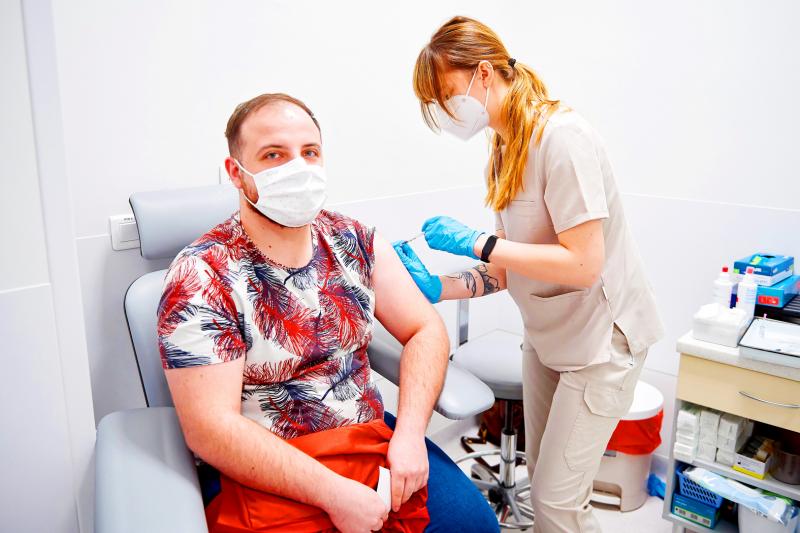Drugmakers — including Pfizer Inc, Sanofi SA and GlaxoSmithKline PLC (GSK) — plan to raise prices on more than 300 drugs in the US from yesterday, according to drugmakers and data analyzed by healthcare research firm 3 Axis Advisors.
The increases come as drugmakers are reeling from effects of the COVID-19 pandemic, which has reduced doctor visits and demand for some drugs. They are also fighting new drug price cutting rules from US President Donald Trump’s administration, which would reduce the industry’s profitability.
The companies kept their price increases at 10 percent or below, and the largest drug companies to raise prices so far, Pfizer and Sanofi, kept nearly all of their increases at 5 percent or less, said 3 Axis, a consulting firm that works with pharmacists groups, health plans and foundations on drug pricing and supply chain issues.

Photo: EPA-EFE
GSK did raise prices on two vaccines — shingles vaccine Shingrix, and diphtheria, tetanus and pertussis vaccine Pediarix — by 7 percent and 8.6 percent, respectively, 3 Axis said.
Teva Pharmaceuticals Inc hiked prices on 15 drugs, including Austedo, which treats rare neurological disorders, and asthma steroid Qvar, which together grossed more than US$650 million in sales in 2019 and saw price hikes of 5 to 6 percent.
Teva hiked prices for some drugs — including muscle relaxant Amrix and narcolepsy treatment Nuvigil — by as much as 9.4 percent.
More price hikes were expected to be announced yesterday, as well as early this month.
Last year, drugmakers raised prices on more than 860 drugs by an average of about 5 percent, 3 Axis said.
Drug price increases have slowed substantially since 2015, in terms of amount and the number of drugs affected.
The increases come as pharmaceutical companies such as Pfizer are playing hero by developing vaccines for COVID-19 in record time.
The hikes could help make up for lost revenue, as doctors’ visits and new prescriptions plummeted during COVID-19 lockdowns.
Pfizer plans to raise prices on more than 60 drugs by 0.5 to 5 percent, including increases of about 5 percent on some top sellers, such as rheumatoid arthritis treatment Xeljanz, and cancer drugs Ibrance and Inlyta.
Pfizer said that it adjusted the list prices of its drugs by about 1.3 percent across all products in its portfolio, in line with inflation.
“This modest increase is necessary to support investments that allow us to continue to discover new medicines and deliver those breakthroughs to the patients who need them,” spokeswoman Amy Rose said in a statement, pointing in particular to the COVID-19 vaccine that the company developed with Germany’s BioNTech SE.
Pfizer’s net prices have actually fallen for the past three years, it said.
France’s Sanofi plans to increase prices on a number of vaccines by 5 percent or less, and would announce more price increases later this month, spokeswoman Ashleigh Koss said.
None of the company’s price increases would be above 5.1 percent, the expected growth rate of US health spending, she said.
Slashing US prescription drug prices — which are among the highest in the world — was a focus of Trump, after making it a core pledge of his 2016 campaign.
Late last year, Trump issued several executive orders meant to cut prices, but their effect could be limited by legal challenges and other problems.

BYPASSING CHINA TARIFFS: In the first five months of this year, Foxconn sent US$4.4bn of iPhones to the US from India, compared with US$3.7bn in the whole of last year Nearly all the iPhones exported by Foxconn Technology Group (富士康科技集團) from India went to the US between March and last month, customs data showed, far above last year’s average of 50 percent and a clear sign of Apple Inc’s efforts to bypass high US tariffs imposed on China. The numbers, being reported by Reuters for the first time, show that Apple has realigned its India exports to almost exclusively serve the US market, when previously the devices were more widely distributed to nations including the Netherlands and the Czech Republic. During March to last month, Foxconn, known as Hon Hai Precision Industry

Taiwan Semiconductor Manufacturing Co (TSMC, 台積電) and the University of Tokyo (UTokyo) yesterday announced the launch of the TSMC-UTokyo Lab to promote advanced semiconductor research, education and talent development. The lab is TSMC’s first laboratory collaboration with a university outside Taiwan, the company said in a statement. The lab would leverage “the extensive knowledge, experience, and creativity” of both institutions, the company said. It is located in the Asano Section of UTokyo’s Hongo, Tokyo, campus and would be managed by UTokyo faculty, guided by directors from UTokyo and TSMC, the company said. TSMC began working with UTokyo in 2019, resulting in 21 research projects,

Ashton Hall’s morning routine involves dunking his head in iced Saratoga Spring Water. For the company that sells the bottled water — Hall’s brand of choice for drinking, brushing his teeth and submerging himself — that is fantastic news. “We’re so thankful to this incredible fitness influencer called Ashton Hall,” Saratoga owner Primo Brands Corp’s CEO Robbert Rietbroek said on an earnings call after Hall’s morning routine video went viral. “He really helped put our brand on the map.” Primo Brands, which was not affiliated with Hall when he made his video, is among the increasing number of companies benefiting from influencer

Quanta Computer Inc (廣達) chairman Barry Lam (林百里) yesterday expressed a downbeat view about the prospects of humanoid robots, given high manufacturing costs and a lack of target customers. Despite rising demand and high expectations for humanoid robots, high research-and-development costs and uncertain profitability remain major concerns, Lam told reporters following the company’s annual shareholders’ meeting in Taoyuan. “Since it seems a bit unworthy to use such high-cost robots to do household chores, I believe robots designed for specific purposes would be more valuable and present a better business opportunity,” Lam said Instead of investing in humanoid robots, Quanta has opted to invest